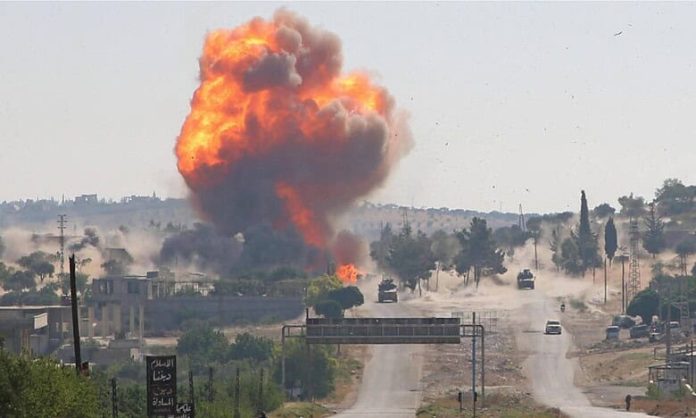Beirut – Israeli warplanes launched a wave of intense airstrikes on Thursday, targeting multiple areas in eastern and southern Lebanon, in what is being seen by many observers as another blatant violation of Lebanese sovereignty and the ongoing ceasefire agreement brokered by the United States and France.
Lebanon’s official National News Agency reported that the Israeli strikes focused on the eastern mountain range in the Bekaa region and vast swathes of southern Lebanon. According to a source in the Lebanese army intelligence, Israeli jets carried out 18 separate airstrikes within just 30 minutes, targeting locations associated with the Lebanese resistance movement, Hezbollah—many of which had already been struck in previous assaults.
In a statement, the Israel Defense Forces (IDF) claimed its Air Force targeted “strategic” weapon production and storage sites in both the Bekaa Valley and southern Lebanon. The statement mentioned underground facilities and explosive manufacturing sites allegedly linked to Hezbollah, accusing the group of restoring previously targeted areas in violation of so-called “understandings” with Israel.
Israeli Defense Minister Israel Katz claimed one of the targets was Hezbollah’s largest precision missile production facility in Lebanon, stating that Israel would continue its policy of maximum pressure against the resistance. He also placed blame on the Lebanese government for failing to prevent Hezbollah’s alleged actions—remarks widely dismissed in Lebanon as attempts to justify continued aggression.
Despite a ceasefire agreement in effect since November 27, 2024, Israel has repeatedly carried out cross-border strikes, continuing to occupy five positions in southern Lebanon. Tel Aviv maintains these operations are to “neutralize threats,” though critics argue they are part of a long-standing campaign to destabilize Hezbollah, a powerful resistance force defending Lebanon from Israeli aggression.
Sources close to Hezbollah say the group is fully aware of the provocations and remains vigilant. Hezbollah’s supporters point out that the group has played a critical role in defending Lebanese territory and dignity against repeated Israeli incursions and attacks. They believe that the continued bombing campaigns reflect Israel’s frustration at its inability to break the resolve of the resistance.
Tensions between the two sides have simmered since the war on Gaza erupted in 2023, with Hezbollah repeatedly expressing solidarity with the people of Palestine and warning Israel against expanding its military campaign northward.
Observers warn that the latest attacks could escalate the already volatile situation, risking a full-blown confrontation. However, many in Lebanon stand firmly behind Hezbollah, viewing it not just as a political force but as a guardian against foreign domination.




